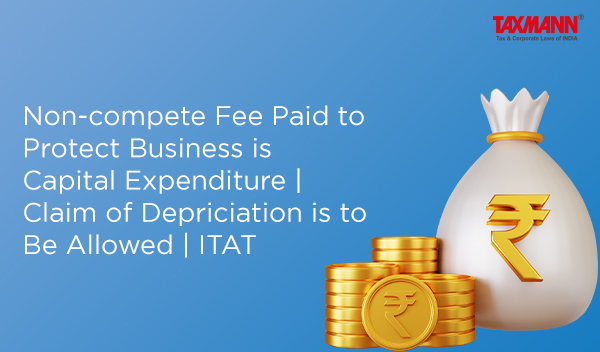Non-compete Fee Paid to Protect Business is Capital Expenditure | Claim of Depriciation is to Be Allowed | ITAT
- Blog|News|Income Tax|
- 2 Min Read
- By Taxmann
- |
- Last Updated on 3 November, 2023

Case Details: Eaton Power Quality Private Limited vs. DCIT - [2023] 156 taxmann.com 14 (Chennai-Trib.)
Judiciary and Counsel Details
-
- Mahavir Singh, Vice-president & Manoj Kumar Aggarwal, Accountant Member
- Vishal Kalra, Adv. for the Appellant.
- V. Suresh Guduri for the Respondent.
Facts of the Case
Assessee was engaged in manufacturing and selling fuse and fuse fittings to both export and domestic markets and engaged in trading activities. During the assessment proceedings, the Assessing Officer (AO) noted that the company had acquired the fuse and fuse accessories business from another company for a total consideration of Rs. 6.12 crores.
Assessee claimed deductions amounting to Rs. 3.22 crores under various heads, including non-compete fees. AO disallowed these deductions, considering them as capital expenditure.
On appeal, the CIT(A) confirmed the action of the AO. Aggrieved by the order, the assessee filed an appeal to the Chennai Tribunal.
ITAT Held
The Tribunal held that the non-compete fee paid by the assessee formed part of the initial outlay on the acquisition of the business. The combined reading of the asset purchase agreement and non-compete agreement suggested that the non-compete agreement was very much part of the entire business purchase by the assessee.
By virtue of the non-compete agreement, the assessee had acquired the right to carry on business unfettered by any competition, which resulted in the protection of the business as a whole and will help appreciate the whole of the capital assets.
Further, the alternative argument of the assessee that since it was held as capital expenditure, the assessee is entitled to depreciation under section 32(1)(ii) was agreeable. Thus, the AO was directed to allow depreciation on payments made on non-compete fees under section 32(1)(ii).
Disclaimer: The content/information published on the website is only for general information of the user and shall not be construed as legal advice. While the Taxmann has exercised reasonable efforts to ensure the veracity of information/content published, Taxmann shall be under no liability in any manner whatsoever for incorrect information, if any.

Taxmann Publications has a dedicated in-house Research & Editorial Team. This team consists of a team of Chartered Accountants, Company Secretaries, and Lawyers. This team works under the guidance and supervision of editor-in-chief Mr Rakesh Bhargava.
The Research and Editorial Team is responsible for developing reliable and accurate content for the readers. The team follows the six-sigma approach to achieve the benchmark of zero error in its publications and research platforms. The team ensures that the following publication guidelines are thoroughly followed while developing the content:
- The statutory material is obtained only from the authorized and reliable sources
- All the latest developments in the judicial and legislative fields are covered
- Prepare the analytical write-ups on current, controversial, and important issues to help the readers to understand the concept and its implications
- Every content published by Taxmann is complete, accurate and lucid
- All evidence-based statements are supported with proper reference to Section, Circular No., Notification No. or citations
- The golden rules of grammar, style and consistency are thoroughly followed
- Font and size that’s easy to read and remain consistent across all imprint and digital publications are applied



 CA | CS | CMA
CA | CS | CMA
